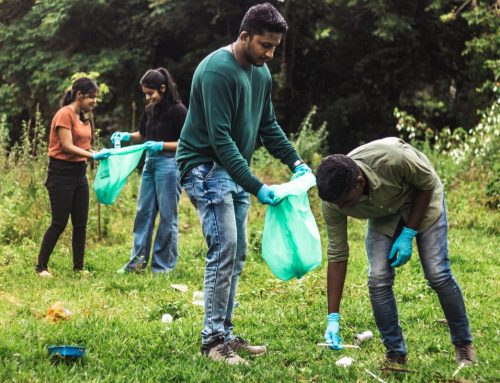An organic lifestyle encompasses a holistic approach to living that prioritizes health, sustainability, and environmental consciousness. Embracing an organic lifestyle involves making mindful choices that promote personal well-being while fostering respect for the planet. It revolves around consuming organic foods, using natural products, and adopting eco-conscious habits in everyday life.
This lifestyle is rooted in the belief that opting for organic, chemical-free options not only benefits individual health but also contributes to a more sustainable and harmonious relationship with the environment. Organic living encourages a deeper connection to nature, advocating for ethical practices that support biodiversity, reduce pollution, and promote the overall well-being of both individuals and the planet.
Boc’n’Roll: a small, huge step towards having an organic lifestyle
The Boc’n’Roll, a reusable and eco-friendly alternative to traditional food wraps or plastic bags, aligns perfectly with the ethos of an organic lifestyle. This innovative and versatile product helps reduce single-use plastics by providing a sustainable way to carry food. Made from eco-friendly materials, the Boc’n’Roll promotes waste reduction, allowing individuals to transport snacks or sandwiches conveniently without generating disposable waste.
Its washable and reusable nature makes it an excellent addition to an eco-conscious lifestyle, contributing to a more sustainable and environmentally friendly daily routine.
How to have an organic lifestyle
Adopting an organic lifestyle involves embracing various practices that promote a healthier and more environmentally friendly way of living:
-
Choosing Organic Foods
- Opt for organic produce and food items devoid of synthetic pesticides, chemicals, and genetically modified organisms (GMOs). Prioritize organic fruits, vegetables, grains, and dairy products whenever feasible to minimize exposure to harmful substances.
-
Supporting Local Farmers’ Markets and Organic Stores
- Explore local farmers’ markets or organic stores to access fresh, locally sourced, and organic produce. This not only ensures high-quality products but also supports local farmers and reduces the environmental impact associated with long-distance food transportation.
-
Cultivating Your Garden
- Start a garden, even if space is limited, to grow your organic herbs, vegetables, or fruits. This hands-on approach allows you to oversee cultivation methods, ensuring your produce is grown without harmful pesticides or chemicals.
-
Opting for Organic Animal Products
- If you consume animal products, choose organic meat, eggs, and dairy sourced from animals raised in natural conditions, without the use of antibiotics or growth hormones. This supports animal welfare and reduces exposure to potentially harmful substances.
-
Understanding Certifications
- Familiarize yourself with certifications such as USDA Organic or Non-GMO Project Verified. Checking for these labels on products ensures they meet organic standards, promoting transparency in farming and production practices.
-
Switching to Natural Cleaning Solutions
- Transition to natural cleaning products or create your own using simple ingredients like vinegar, baking soda, or essential oils. These alternatives effectively clean while minimizing exposure to harsh chemicals harmful to both health and the environment.
-
Embracing Organic Clothing
- Consider garments made from organic materials like cotton, hemp, or bamboo. These fabrics are free from synthetic chemicals and pesticides, promoting better skin health and reducing environmental impact.
-
Reducing Single-Use Plastics
- Minimize your reliance on single-use plastics by adopting reusable alternatives such as our reusable snack bags, water bottles, and containers. This practice significantly cuts down on waste and lessens your environmental footprint.
-
Supporting Sustainable Brands
- Encourage sustainability by favoring companies committed to eco-friendly and ethical practices. Choose products with recyclable packaging or minimal packaging, supporting the reduction of waste.
-
Conserving Energy and Water
- Conserve energy by utilizing energy-efficient appliances and reduce your water footprint by fixing leaks and employing water-saving devices. Simple habits like turning off electronics when not in use and opting for natural lighting can also contribute to energy conservation.
-
Choosing Natural Personal Care Products
- Opt for organic and natural beauty and personal care items devoid of harmful chemicals. Look for skincare and personal care products made with organic ingredients, promoting healthier choices for yourself and the environment.
-
Continuous Education
- Stay informed about environmental issues, organic farming practices, and sustainable living. Keeping up with information and understanding the benefits of an organic lifestyle reinforces your commitment tomaking eco-conscious choices.
-
Supporting Community Gardens
- Participate in or support community gardens that promote organic farming practices. Engage in communal efforts to cultivate organic produce and share knowledge about sustainable gardening.
-
Preserving and Canning
- Learn preservation techniques such as canning, pickling, or fermenting organic produce when it’s in season. This ensures access to organic foods throughout the year while reducing food waste.
-
Mindful Consumption
- Practice mindful consumption by buying only what you need and avoiding unnecessary purchases. This reduces overconsumption, minimizes waste, and promotes a more sustainable lifestyle.
-
DIY Personal Care Products
- Make your own natural personal care items, like toothpaste, deodorant, or skincare products, using simple, organic ingredients. This allows you to control what goes into the products you use daily.
-
Zero Waste Lifestyle
- Embrace a zero-waste lifestyle by prioritizing reusable and package-free alternatives for all aspects of life, from grocery shopping to daily routines. Reduce, reuse, and recycle to minimize waste generation.
-
Green Transport Choices
- Opt for eco-friendly modes of transportation, such as cycling, walking, or using public transit whenever possible. This reduces carbon emissions and supports a healthier environment.
-
Home Energy Efficiency
- Implement energy-saving practices at home, such as using energy-efficient appliances, insulating your home, and installing solar panels to reduce reliance on non-renewable energy sources.
-
Environmental Advocacy and Volunteering
- Get involved in environmental advocacy groups or volunteer for organizations that support organic farming, conservation efforts, or sustainable living. Participating in local initiatives can create a larger impact in promoting organic practices within communities.
-
Eco-conscious Gift Giving
- Opt for eco-friendly and sustainable gifts, such as reusable items, potted plants, or experiences, promoting a culture of sustainability among friends and family.
-
Mindful Disposal of Electronic Waste
- Recycle electronic devices and gadgets responsibly through certified e-waste recycling centers to prevent hazardous materials from entering landfills.
-
Supporting Sustainable Fisheries
- Choose sustainably sourced seafood certified by organizations like the Marine Stewardship Council (MSC) to support responsible fishing practices and marine conservation efforts.
-
Reducing Food Waste
- Plan meals, store food properly, and repurpose leftovers to minimize food waste. Composting organic waste is another effective way to reduce waste while enriching soil.
-
Promoting Biodiversity
- Encourage biodiversity by planting native species in your garden, supporting wildlife habitats, and avoiding the use of harmful pesticides or chemicals that could harm local ecosystems.
-
Upcycle and Repurpose
- Embrace upcycling by creatively repurposing items and materials to give them a new life rather than discarding them. This reduces waste and encourages a more sustainable approach to consumption.
-
Mindful Travel Practices
- Engage in eco-conscious travel by choosing destinations and accommodations that prioritize sustainability. Respect local cultures and ecosystems and offset your travel carbon footprint by supporting carbon offset programs.
-
Practice Mindfulness in Consumer Choices
- Be mindful of the environmental impact of products you purchase. Consider factors such as a product’s lifecycle, materials used, and the brand’s sustainability practices before making buying decisions.
-
Sustainable Landscaping
- Transform your outdoor space into a sustainable landscape by using native plants, employing water-saving irrigation methods, and avoiding chemical pesticides or fertilizers.
-
Reduce Paper Waste
- Embrace digital alternatives to paper such as e-books, e-receipts, and digital subscriptions to minimize paper waste. Utilize both sides of paper when necessary and opt for recycled or tree-free paper products.

Embracing an organic lifestyle involves a holistic commitment to sustainable practices that benefit both individuals and the environment. It revolves around conscious choices, from opting for organic foods and clothing to reducing waste and supporting ethical and eco-friendly initiatives. By prioritizing organic products, one contributes to a healthier ecosystem, supports local economies, and fosters a more sustainable future.









